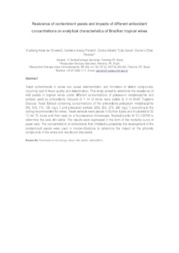Resistance of contaminant yeasts and impacts of different antioxidant concentrations on analytical characteristics of Brazilian tropical wines.
Resistance of contaminant yeasts and impacts of different antioxidant concentrations on analytical characteristics of Brazilian tropical wines.
Author(s): OLIVEIRA, E. A. de; PEREIRA, C. A.; GAVA, C. A. T.; PEREIRA, G. E.
Summary: Yeast contaminants in wines can cause refermentation and formation of defect compounds, occurring lost of flavor quality and deterioration. This study aimed to determine the resistance of wild yeasts in tropical wines under different concentrations of potassium metabisulphite and sorbate used as antioxidants. Aliquots of 1 ml of wines were added to 9 ml Broth Tryptone Glucose Yeast Extract containing concentrations of the antioxidants potassium metabisulphite (90, 100, 110, 120 mg.L-1) and potassium sorbate (200, 250, 275, 280 mg.L-1) according to the ceiling recommended for wines. Yeast extracts were placed in Durhan tubes and incubated at 30 °C for 72 hours and then read on a fluorescence microscope, NucleoCounter ® YC-100TM to determine the cells still viable. The results were expressed in the form of the mortality curve of yeast cells. The concentrations of antioxidants that inhibited successfully the development of the contaminant yeasts were used in microvinifications to determine the impact on the phenolic compounds in the wines and results are discussed.
Publication year: 2011
Types of publication: Abstract in annals or event proceedings
Unit: Embrapa Semi-arid Region
Observation
Some of Embrapa's publications are published as ePub files. To read them, use or download one of the following free software options to your computer or mobile device. Android: Google Play Books; IOS: iBooks; Windows and Linux: Calibre.
Access other publications
Access the Agricultural Research Database (BDPA) to consult Embrapa's full library collection and records.
Visit Embrapa Bookstore to purchase books and other publications sold by Embrapa.

